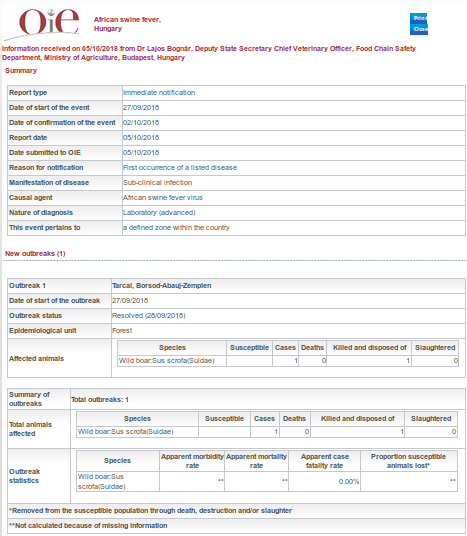 |
| Base map Credit Wikipedia |
#13,564
One of the unresolved mysteries about the recent and rapid territorial gains made by African Swine Fever around the world is exactly how it is being transmitted. Wild boar are one known vector, and the (legal or illegal) shipment of contaminated food or feed products is usually strongly suspected, but solid epidemiological links are often hard to find.
Last month, in African Swine Fever Jumps To Belgium, we looked at a Swine Disease Global Surveillance Report that stated:
It appears to have jumped a considerable distance from previously affected countries, about 300 miles (500 km) from the border with the Czech Republic, 500 miles from Hungary, and 750 miles (1,200 km) from the border with Romania (approximate distances).The appearance of ASF in 8 Chinese Provinces and/or territories - spanning thousands of kilometers - starting last August is another example. While wild boar undoubtedly play a role, they clearly aren't the only vector.
African Swine Fever was first detected in Hungary last April in a wild boar in Heves County, and the following month in Szabolcs-Szatmár-Bereg. Today the OIE notifies us of the first occurrence of the disease in Borsod-Abauj-Zemplen county (see map above).
According to a report (see below) posted on Hungary's National Laboratory of Food Chain Safety (Nébih) website, this represents:
`A relatively large distance (more than 70km) from previous cases and available epidemiological data can not be linked to previous cases.'First the OIE report, followed by the announcement from Nébih.
African boar swine in Borsod county was also pointed at Nébih in a wild boar
3 October 2018
The National Laboratory of Food Chain Safety (Nébih) has been reported yesterday by feral pigs on the outskirts of the village of Tarcal, Borsod-Abaúj-Zemplén, on the outbreak of African swine fever (ASP) virus. Veterinary experts, prompted by the national veterinarian, started to take the necessary measures immediately. The most important is continuing to prevent the epidemic from spreading to domestic pigs, for which it is essential for breeders to fully comply with the disease control provisions.
After the establishment of the ASP at the end of April in Heves County and May, Szabolcs-Szatmár-Bereg, the virus appeared at the border of Tarcal, Borsod-Abaúj-Zemplén county. On October 2, Nébih's laboratory revealed the disease from healthy feral pigs that had been released during the previous breeding process. Epidemic investigation is ongoing. A relatively large distance (more than 70km) from previous cases and available epidemiological data can not be linked to previous cases.
After the ASP was established, the nationwide major veterinarian, as in previous cases, ordered all necessary measures immediately. These include, inter alia, that the National Center for Disease Control designated the infected area and, in particular, the area under special control. For more information about the affected areas and relevant regulations, see the Nébih thematic sub page.
ASP is not dangerous to humans! Its significance is caused by the economic damage caused, on the one hand, by the killing of diseased stocks and, on the other hand, by trade restrictions.
The disease can spread rapidly not only naturally, but also with illegal pig transport, food containing trace elements and contaminated meat. Nébih draws the attention of all livestock farmers to the responsible and responsible behavior in order to prevent the spread of the epidemic to domestic pigs. It should be further emphasized that pigs should not be fed with food waste ("meals") containing animal material! It is important that someone in your pig population suddenly finds fever, death or bleeding symptoms within 24 hours to inform the veterinary service.
The virus remains in infected pigs and raw or semi-finished products for several weeks, frozen meat for years. For this reason, it is important for hikers to leave the food or food remnants in the hiking places besides the designated garbage collectors, even by accident.
Detailed and up-to-date information on the disease, the regulations, restrictions and areas concerned can be found on the Nébih website: http://portal.nebih.gov.hu/afrikai-sertespestis
